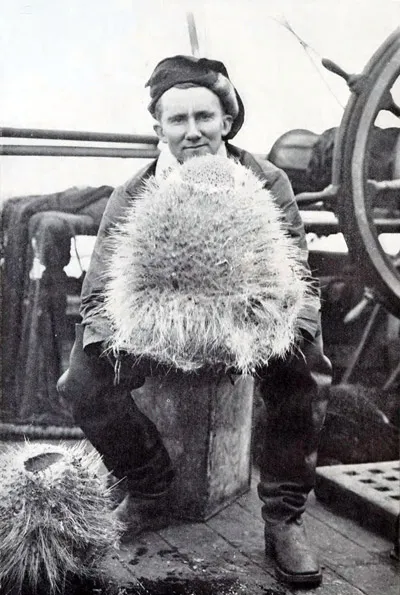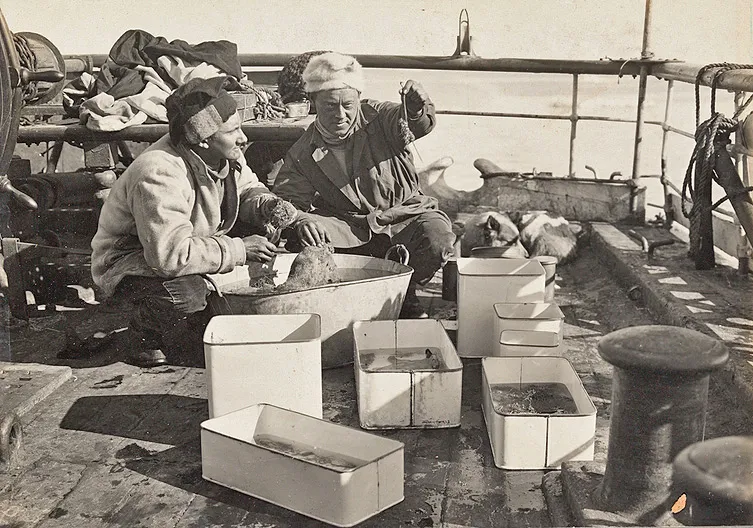Dennis Gascoigne Lillie
(1884 - 1963) - Biographical
notes
Marine zoologist on board Terra-Nova 1910-13

Dennis Gascoigne Lillie
27th August 1884 - 13th May 1963
His name is sometimes given with one n, Denis and his date of birth is sometimes given as 1888.
Born in Kensington, London to a family from New Zealand, Lillie was educated at the University of Birmingham and St. John's College, Cambridge where he gained a zoology degree in 1909. He spent the summer of 1909 at a whaling station in the Inishkea Islands off the N.W. coast of Ireland studying whales.
Lillie was recruited to Scott's British Antarctic Expedition on the Terra Nova by chief scientist Edward Wilson, he prepared for the expedition in Plymouth at the Marine Biological Laboratory along with fellow marine biologist on the voyage, Edward Nelson, they sailed on the Terra Nova for Antarctica on the 15th of June 1910 from Cardiff. He got off to a poor start when he was found to have measles shortly after departure and was quarantined in the ship's darkroom though had recovered by the time the Terra Nova next reached land at South Trinidad in the Caribbean.
His role in the expedition was as marine zoologist and biologist in charge of operations on board the ship, he began collecting specimens off the coast of Brazil and then in the Falklands Islands before arriving in Antarctica. He never went ashore in Antarctica though was on the Terra Nova for her three visits during the expedition. He spent the two intervening austral winters in New Zealand and stayed there for some time following the expedition again studying whales.
One of Lillie's tasks as a marine zoologist was trawling the ocean depths to see what animals lived down there, at the time virtually nothing was known about the deep seas and even less about the southern polar sea. He would lower equipment while the Terra Nova was static or sailing and then haul it up again to see what he had found while surrounded by a crowd of the ships crew who had gathered to get a better view of the strange life-forms that were emerging.
Lillie was intellectual, eccentric and popular with his companions, he believed in reincarnation and claimed to be able to remember past lives as a Persian and a Roman. He was a caricaturist and made a number of sketches of the expedition members on the ship, some of his caricatures are in the National Portrait Gallery, London, others were redrawn by Edward Wilson and published in the "South Polar Times" during the Antarctic winter. He was awarded the Polar Medal in July 1913 following the expedition.
On return to England Lillie received an M.A. from Cambridge where he had gone to work up his findings with others from the expedition. The events of the First World War soon overtook this work however and as a conscientious objector Lillie was put to work as a military bacteriologist, as he put it:
..examining military shit for three pounds a week.
In 1917 he was planning to go to East Africa but with no prior history or warning, he suffered a severe mental breakdown in February 1918 with depression, delusion and suicidal thoughts, he was admitted to Bethlem Hospital, London for three years. Usually stays at Bethlem were limited to a year, this was waived because of payments from the Captain Scott Memorial Fund, money left over from the expedition when all debts had been paid. Following the deaths of Scott and the other four members of the South Polar Party the public had donated generously.
He was discharged from Bethlem in January 1921 and began lecturing at Cambridge University, sadly he relapsed and was admitted to Buckinghamshire Mental Hospital in October of the same year, returning to Bethlem a month later. He never fully recovered and was transferred to Salisbury's Old Manor Hospital in April 1924. He was to spend 42 of his 78 years in hospitals. Cherry-Garrard and Frank Debenham tried a number of times to visit him but were unable to, whether it was the hospitals that didn't allow the visit or Lillie refusing visitors is not know.
He died aged 78 Redhills Hospital, Exeter, on the 13th of May 1963.
His 3 years spent on the ship in and around Antarctica were his happiest.
"the lovely, laughing Lillie" - Cecil Meares - in charge of dogs

Dennis Lillie (l) and
George Levick (r),
biologists - on board the Terra
Nova sorting through a catch
References to Dennis Lillie by Cherry-Garrard in "The Worst Journey in the World"
-
In both Wilson and Lillie we had skilled whale observers, and their work has gone far to elucidate the still obscure questions of whale distribution in the South.
-
Lillie and Nelson were both busy tow-netting for plankton with full-speed, Apstein, Nansen, 24-and 180-mesh nets.
-
However, man proposes but God disposes, and I was waked up by Lillie at one o'clock this morning by the astounding news that there was a ship in the bay at anchor to the sea-ice. All was confusion on board for a few minutes, everybody rushing up on deck with cameras and clothes.
"It was no false alarm, there she was within a few yards of us, and what is more, those of us who had read Nansen's books recognized the Fram. -
Lillie has secured water samples at 50, 100, 150, and 170 fathoms and has had a haul with the plankton net, and Williams is endeavouring to fit up the trawl for a haul to-morrow if we get time and appropriate weather.
-
Some of our men were ambitious: some wanted money, others a name; some a help up the scientific ladder, others an F.R.S. Why not? But we had men who did not care a rap for money or fame. I do not believe it mattered to Wilson when he found that Amundsen had reached the Pole a few days before him - not much. Pennell would have been very bored if you had given him a knighthood. Lillie, Bowers, Priestley, Debenham, Atkinson and many others were much the same.
-
But as Lillie squatted on the poop surrounded by an inner ring of jars and tangled masses of the catch, and an outer ring of curious scientists, pseudo-scientists and seamen, no find pleased him so much as the frequent discovery of pieces of Cephalodiscus rarus, of which even now there are but some four jars full in the world. It is as interesting as it is uncommon, for its ancestor was a link between the vertebrates and invertebrates, though no one knows what it was like. It has been a vertebrate and gone back, and now has the signs of a notochord in early life, and it also has gills. First found on the Graham's Land side of the Antarctic continent, it has only recently been discovered in the Ross Sea, and occurs nowhere else in the world so far as is known.
References to Dennis Lillie by Scott in "Scott's Last Expedition"
-
On board the ship I was taken in to see Lillie's catch of sea animals. It was wonderful, quantities of sponges, isopods, pentapods, large shrimps, corals, &c., &c.--but the _piece de resistance_ was the capture of several buckets full of Cephalodiscus of which only seven pieces had been previously caught. Lillie is immensely pleased, feeling that it alone repays the whole enterprise.
Organisms collected during the Terra Nova Expedition named after Dennis Lillie
- Notopogon lilliei - a fish
- Apomatus lilliei - a serpulid worm
- Lilliella - a genus of sea
anemones
- Linguifolium lillieanum - a fossil plant collected in New Zealand in 1911 by Lillie and named in his honour by palaeobotanist E. A. Newell Arber in 1913.
Landmarks named after Dennis Lillie
Feature Name: Lillie Glacier
Type: Glacier
Latitude:
70° 45'S
Longitude: 163°
55'E
Description: A large
glacier, about 100 mi long and 10 mi wide, between Bowers Mountains
on the W and Concord and Anare Mountains on the E, flowing to
Ob' Bay on the coast and forming the Lillie Glacier Tongue.
The glacier tongue was discovered by the British Antarctic Expedition
(BrAE), 1910-13, and named for Dennis G. Lillie, biologist on
the Terra Nova. The name Lillie has since been extended to the
entire glacier as it is now known.
Feature Name: Lillie Glacier
Tongue
Type: Ice Tongue
Latitude:
72° 35'S
Longitude: 163°
49'E
Description: The prominent
seaward extension of the Lillie Glacier into Ob' Bay.
Other Crew of the Terra Nova Expedition
Abbot,
George Percy - Petty Officer, R.N. - 1, 2, N
Atkinson, Edward
L. - R.N. - surgeon, parasitologist - 1, 2, D, P, S
Balson,
Albert - Leading seaman, R.N.- 1, 2
Bowers,
Henry Robertson - Lieutenant - 1, 2, D, C,
Po
Browning,
Frank Vernon - Petty Officer - 1, 2, N
Campbell,
Victor - Lieutenant, R.N. - 1, 2, N
Cheetham,
Alfred B. - Boatswain (Bosun), R.N.R.
Cherry-Garrard,
Apsley - Assistant zoologist - 1, 2, D, C, S
Crean,
Tom - petty officer, R.N. - 1, 2, D, P, S
Debenham, Frank
- Geologist - 1, 2, iW, iiW
Dickason,
Harry - Able Seaman - 1, 2, N
Evans, Edgar - petty
officer, R.N. - 1, iW, Po
Evans, Edward R.G.R. - Lieutenant, R.N. "Teddy Evans" -
second in command, and Captain of the Terra Nova - 1, D, P
Girev
(Geroff), Dmitriy - Dog driver - 1, 2, D, P, S
Gran,
Tryggve - ski expert - 1, 2, D, iiW, S
Lashly, William
- chief stoker, R.N. - 1, 2, P, S
Levick,
G. Murray - Surgeon, R.N. - 1, 2, N
Lillie, Dennis Gascoigne - Biologist
on the ship
McLeod, Thomas
F. - Able seaman - 1, 2
Meares, Cecil
H. - in charge of dogs - 1, D, P
Oates, Lawrence
- Capt. 6th Iniskilling Dragoons - 1, D,
Po
Ponting,
Herbert G. - Camera artist - 1
Priestley,
Raymond E. - Geologist - 1, 2, N
Omelchenko,
Anton - Groom - 1
Scott, Robert
Falcon - Commander, R.N. -
Expedition leader - 1, D, Po
Simpson,
George - Meteorologist - 1
Taylor,
T. Griffith - Geologist - 1, iW, iiW
Wilson,
Edward Adrian - chief of scientific staff and biologist - 1, D, C,
Po
Wright,
Charles Seymour - Physicist - 1, 2, iW, P, S
Key:
1 - first winter
2 - second winter
iW - first western party
iiW - second western party
N - northern
party
D - depot laying for south pole journey
P - south pole party
C - winter journey to Cape Crozier
S - search party for south Pole
party
Po - reached
South Pole
Biographical information
- I am concentrating on the Polar experiences of the men involved.
Any further information or pictures visitors may have will be gratefully received.
Please email
- Paul Ward, webmaster.
What are the chances that my ancestor was an unsung part of the Heroic Age
of Antarctic Exploration?
